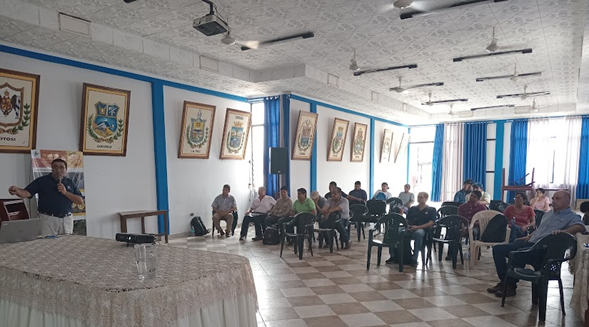Experts from the Fontagro HLB project, together with local authorities from the Autonomous Municipal Government of Bermejo, Bolivia, carried out a training day on the prevention of HLB disease, a threat to regional citrus production.

A distinguished delegation from the Fontagro project Sustainable control of the HLB vector in family farming, co-financed by the Argentine Fund for International Cooperation for Development (FONTAGRO), visited the Autonomous Municipal Government of Bermejo, Bolivia-Co-executor of the Fontagro HLB project-, on November 21 and 22, 2023, with the aim of interacting with local authorities and providing key training on the prevention of HLB disease in the region.
The delegation was composed of:
- Silvana Giancola, project coordinator from INTA CIEP, Argentina;
- Alcides Aguirre, from INTA EEA Bella Vista, alternate coordinator, responsible for the project plots (Component 1) and technical referent for the Bella Vista demonstration plot, Corrientes, Argentina;
- Alberto Gochez also from INTA EEA Bella Vista;
- from INTA EEA Yuto, province of Jujuy that shares a border with Bolivia, Silvia Tapia, Marcos Garzón and Sebastian Buono
This group of professionals offered comprehensive training on HLB disease, its vector and preventive measures, strengthening international collaboration in crop protection and food security.
On November 21, a protocolary meeting was held with the Mayor of the Municipality, Engineer Irineo Flores Martínez. During this session, the delegation presented the progress of the project and a constructive dialogue was established on the experiences of preventive measures taken by municipalities in Argentina. In particular, the importance of eradicating Murraya paniculata plants, known as Myrtle or Paraguayan Jasmine, from public trees was highlighted, due to their role as a host for the disease vector and its vector, the Asian citrus psyllid (Diaphorina citri). Printed material (banners) of the HLB prevention and management campaign, designed within the framework of the aforementioned project, was also delivered to the local project referent in the Bermejo Government, Renán López.
On November 22, a training session was held in the Salón de Escudos of the Municipality, aimed at 29 participants, including 9 women. During the session, participants received detailed information about the Fontagro project, its methods, scope and results. Silvana Giancola, Coordinator of the Fontagro HLB project at INTA CIEP, Argentina, led the presentation.
The departmental head of the Plant Health Area of the National Service for Agricultural Health and Food Safety SENASAG in Tarija, Bolivia, José M. Albarracín, offered a detailed presentation on the missions and functions of SENASAG, as well as the control and prevention measures to prevent the entry of the disease into Bolivian territory, where no positive cases have been registered to date, but there is a vector population.
The presentations continued with Alcides Aguirre on the HLB vector, natural enemies, and management; then Alberto Gochez with information on the HLB disease of citrus fruits. symptomatology, causal agent, world situation and in Argentina.
Afterwards, the INTA EEA Yuto project team presented the results of the project execution in the Palma Sola lot, Jujuy, Argentina, led by Silvia Tapia, who presented the data from the pest monitoring and controls carried out in a context of integrated pest management (IPM); Marcos Garzón with the economic results of the aforementioned implemented management and Sebastián Buono with the impact on the quality of the harvested fruit.
The day ended with a practical training session led by Alcides Aguirre, in the public trees where the abundant presence of Diaphorina citri and its natural enemy, Tamarixia radiata, were observed in the Myrtles or Paraguayan Jasmines (Murraya paniculata), underlining the importance of preventive actions.




